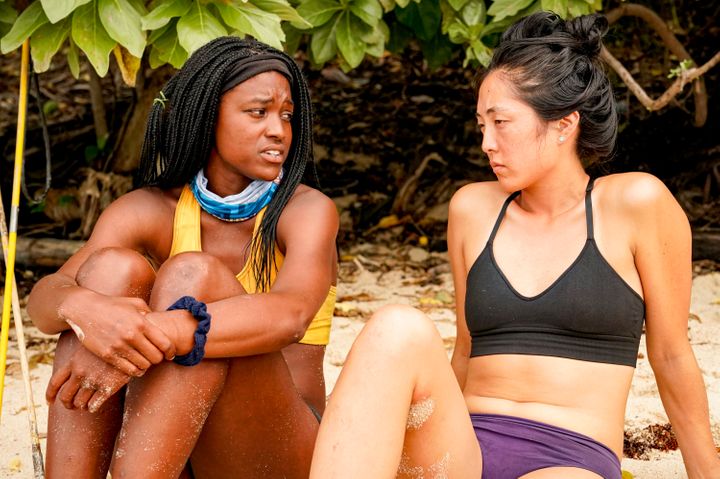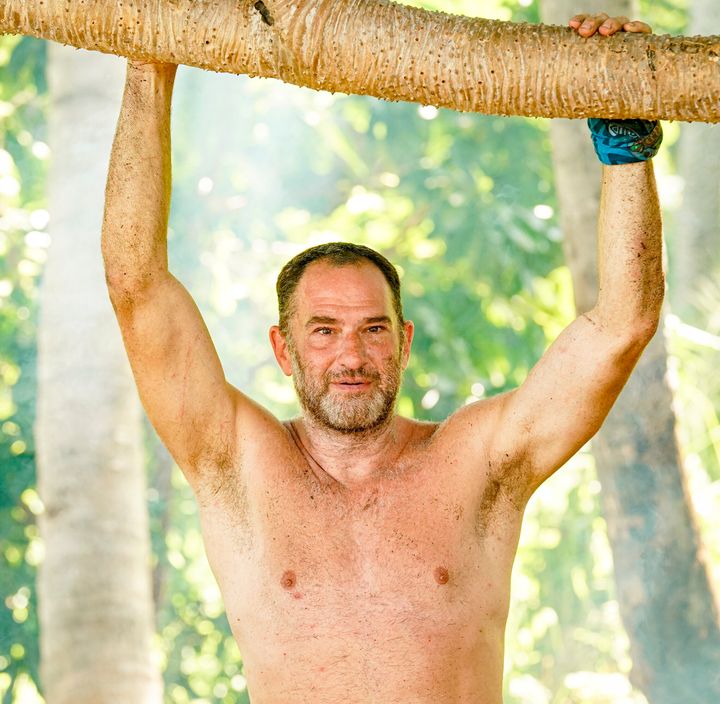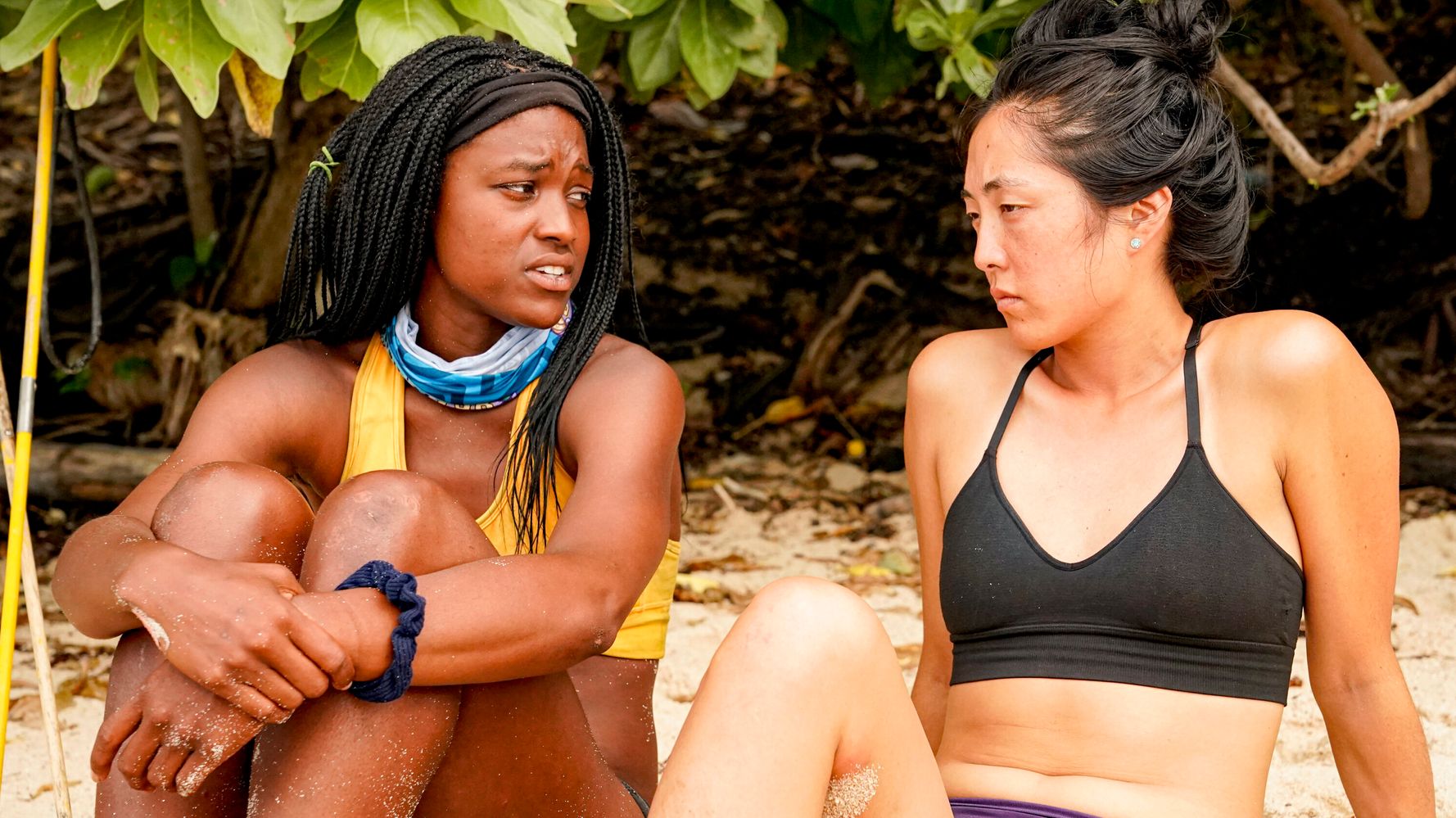[ad_1]
I was on my couch, mouth agape, as I watched Kellee Kim’s torch get snuffed during tribal council on the latest two-part episode of “Survivor: Island of the Idols.” As an avid fan ― I even auditioned to be a contestant ― I’d usually be laughing over the fact that one of the smartest players of the season got sent home with two immunity idols in her pocket. But nothing about this situation was funny.
On Wednesday night, the castaways merged from two tribes into one and began upping their game-play almost immediately. Alliances were formed and reformed, and threats were targeted. At first, Dan Spilo was enemy No. 1.
Due to the film crew’s 24-hour surveillance of the cast, Spilo’s “inappropriate touching” has been documented since the premiere episode in late September, yet he’s continued to showcase this behavior throughout the season’s run. This week, Kim spoke with fellow competitors and producers about Spilo’s unwanted physical contact and how it makes her uncomfortable. Two other female castaways initially supported her speaking out, and even had a few gripes of their own, but ultimately turned against her due to strategic play.
“Survivor” is a social experiment that has captivated me for years. Throwing 16 or so people of different backgrounds, socio-economic statuses, and physical and mental capabilities onto a remote island for 39 days to “outwit, outplay and outlast” each other is compelling, if not gripping, television. But it’s heartbreaking to think that two women would exploit another who has said she has experienced sexual harassment to further themselves in a game for $1 million. Yes, a major goal of “Survivor” is to deceive your competition, but when that competition is a victim, no money should be worth risking basic human decency.

To detail the situation: At the start of the episode, Kim, a 29-year-old MBA student, expressed her discomfort with 48-year-old Hollywood talent manager Spilo’s behavior to fellow female contestant Missy Byrd. He touched her face. He put his fingers through her hair. He placed a hand on the small of her back.
“I had to be like, ‘I don’t like touching people. Please don’t touch me.’ And he still touches me,” she told Byrd.
Byrd, a 24-year-old Air Force veteran, agreed that she herself felt uncomfortable around Spilo. “I lay awake, his arm smothers me,” she told Kim, adding that during the merge feast ― a celebratory meal that occurs each season when the cast unites into one tribe to finish out the game ― Spilo was “wiggling her toes” as he lay on the ground beside where she was sitting. “It’s just inappropriate touching,” she said. “I am not an object.”
Both women made it clear that they didn’t want his actions to interfere with the competition, but Kim further addressed her concerns in an interview package.
“It’s super upsetting because it’s like you can’t do anything about it,” Kim said. “There are always consequences for standing up. This happens in real life, in work settings, in school. You can’t say anything because it’s going to affect your upward trajectory. It’s going to affect how people look at you.”
Tears streamed down her face as she expressed that Spilo’s inappropriate behavior is “a pattern” that’s happened with five different women ― including castaways Byrd, Lauren Beck, Elizabeth Beisel and Molly Byman. That’s when, in a very rare instance on “Survivor,” a producer’s voice chimed in from off-camera.
“If there are issues, to the point where things need to happen, come to me and I will make sure that stops because I don’t want anyone feeling uncomfortable.”
Viewers were then made aware that, after this conversation, producers stepped in to speak with the cast, individually and as a group, about respecting “personal boundaries.” Spilo also received a formal warning, and the game continued. But more difficult conversations arose as the days rolled on.

Turns out Byrd exaggerated her feelings toward Spilo to convince Kim to vote him out at the next tribal council. Byrd also asked her ally Elizabeth Beisel to tell fellow tribe mate Janet Carbin, the 59-year-old mother figure of the group, that Spilo makes all the women uncomfortable and that he needs to go ― all to gain more power.
“Right now, that’s our only play,” Byrd told Beisel, who added in her interview package, “The merge is about numbers, so right now my job is to do whatever it takes to get on the right side of the numbers … if I could play up that card as much as possible, I’ll do it.”
Meanwhile Kim, however upset over Spilo’s behavior, saw Byrd as more of a physical and social threat in the game, so she spoke with her alliance about possibly voting the veteran out. But when members of said alliance alerted Byrd to Kim’s strategy, plans shifted. In turn, Byrd started to convince others to vote savvy Kim out while castaways like Carbin struggled to move past Spilo’s disagreeable behavior.
“I cannot ignore these girls,” Carbin asserted, ultimately deciding that sending him home was the morally correct choice.
At tribal council, Kim was eliminated, Spilo was safe, and Carbin and audiences were left devastated.
The two-part episode continued and at the following tribal council, host Jeff Probst, visibly upset by the entire predicament, let most of the parties involved have a platform to speak their minds. Carbin said she made a decision to vote out Spilo based on her moral character while Spilo ― after getting some heat from Probst ― said he was horrified that he ever made any of the women, particularly Kim, feel uncomfortable.
“True, untrue, it doesn’t matter how I feel, it doesn’t matter if I’m aware of it, it doesn’t matter if I ever sensed it, it doesn’t matter if I knew it happened or didn’t happen, if someone feels it, it’s their truth. I couldn’t be more sorry,” he said, adding, “What upset everybody here is how it turned into game play.”
With that, one hoped to hear from Byrd and Beisel about their deceitful and hurtful strategizing, but neither spoke up. Instead, Carbin broke down in tears as she contemplated leaving the game due to people ignoring important, cultural conversations for a first place ribbon.
“This situation really tests the concept of justified ethics, something that is at the heart of every ‘Survivor’ season,” Probst told Entertainment Weekly. “Where does each player draw their line in the sand? What is OK to do or say and what is off limits? And the bigger question: Are there certain situations that are simply off limits, no matter what?”
Carbin rightly earned the support of viewers, some of whom just couldn’t get over the idea that production would let Spilo remain on the show despite valid allegations against him and clips of his touchy behavior. Still, the other women only stated that his actions were bothersome, and would not be considered harassment. Beisel even said on the episode, “I have never felt uncomfortable and I know what people are talking about but … nobody has come to me with legitimate life concerns. It was little baby snippets here and there that snowballed into something way bigger than it ever should have been.”
As a member of the jury, Kim was not given the chance to speak as it is against “Survivor” policy.
To say this situation is disappointing would be an understatement. This “game” mirrors real life ― it doesn’t matter if you’re a businesswoman on Wall Street or a contestant on a reality competition show, alleged victims can struggle to find the courage to speak out and share their stories when they don’t feel valued or supported. And, of course, those accused have to come to terms with their own part in that cycle.
Carbin said it best: “Anything about sexual uncomfortability has no place in a joking environment, in a game environment. Lives can be destroyed if you’re abused. Lives can be destroyed if you’re falsely accused. And it’s too powerful to play with.”
REAL LIFE. REAL NEWS. REAL VOICES.
Help us tell more of the stories that matter from voices that too often remain unheard.
[ad_2]
Source link

